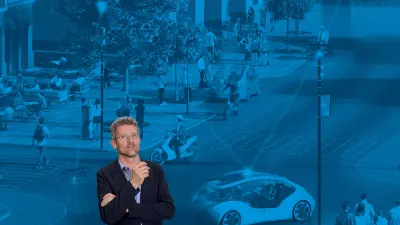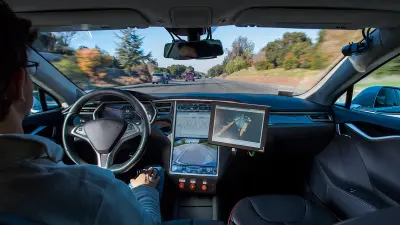How cities can benefit from automated driving
Discussing automated driving with the McKinsey Senior Partner in the Automotive and Advanced Industries sector
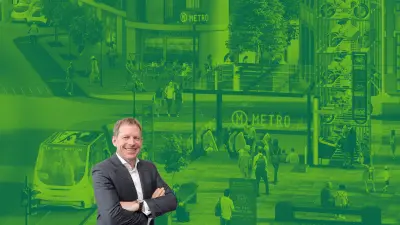
Self-driving cars will change urban mobility significantly. They will also economically impact towns and cities. Traffic fines are likely to become a thing of the past. How urban areas can tap new sources of income and why new jobs will be created by automated shuttles is illuminated by the automotive expert Andreas Tschiesner.

Autonomous vehicles will lead to urban mobility reaching a new level: “It’ll basically be as far reaching as the change from horse-drawn carriages to cars,” says Andreas Tschiesner. As Senior Partner at the McKinsey management consultancy, Tschiesner specializes in the automotive and industry sector and collaborates with many automotive manufacturers and suppliers. According to a McKinsey study, autonomous vehicles will be driving around our towns and cities from 2030 onwards. Projections indicate they will significantly outweigh non-autonomous vehicles between 2040 and 2050. “Self-driving vehicles will then account for about 90 per cent of all journeys in cities,” continued Tschiesner.
“Autonomous driving — it’ll basically be as far reaching as the change from horse-drawn carriages to cars.”
Mobility-mix as a solution
People commuting to work from city suburbs in ten to 15 years time will, according to Tschiesner, call driverless shuttles via an app and be able to travel at prices comparable to those of public transport. Self-driving vehicles however have two advantages over busses and trains: They offer greater privacy and take passengers straight to their destination. Tschiesner believes public transport will nevertheless still play an important role in about 20 years time: “Should every single commuter switch from travelling by bus or train to calling an automated vehicle, then there’ll be gridlock.”
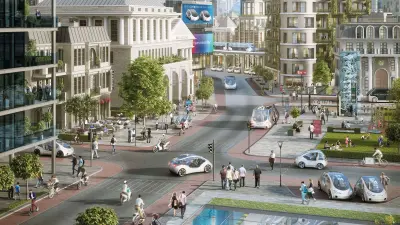
To prevent this from happening, towns and cities will have to intervene and regulate the use of autonomous vehicles. This could be done via road-user charges says Tschiesner. In London there is already a congestion charge that applies to city districts with a high volume of traffic at certain times. It is designed to encourage commuters to take public transport rather than using a car. “The use of automated vehicles will probably be controlled using similar incentive schemes,” believes Tschiesner. “Multiple modes of transport will ensue,” continued Tschiesner. To avoid congestion charges, commuters will take the light railway to a station and then perhaps continue in an automated shuttle to their destination.
30 million euro
the average annual sum raised by the city of Hamburg from parking fines.
Congestion charges instead of parking fines
Congestion charges will however play a part in keeping a city’s income stable. In Hamburg for example, 30 million euro flow into its coffers from traffic fines, including parking tickets. In Stuttgart, 11 million euro is accrued from speed cameras. The income from road traffic fines will sink dramatically when autonomous vehicles start dominating the cityscape: They will always park correctly in parking spaces and keep to speed limits.
Cities that offer driving services
Andreas Tschiesner additionally believes that the towns and cities themselves will offer automated driving services. “The regulatory sovereignty over traffic lies with the city authorities anyway. It’s why they’ll orchestrate self-driving cars via traffic control centers.” Cities could take advantage of the existing traffic control structures and the resulting accompanying competencies to operate own rental stations that not only offer driverless cars but also e-scooters and e-bikes.
“The bottom line is that there will not be less jobs but more.”
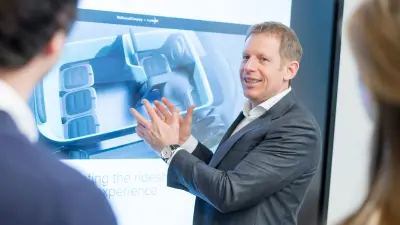
Effects on the job market
The developments in the mobility sector will also be noticed within the job market. Tschiesner has researched the subject together with the city of Berlin. “Cities will basically employ not only fewer bus and train drivers but also civil servants in the public order and traffic departments,” he says. But his study concludes, “The bottom line is that there will not be less jobs but more.”
According to the expert, additional computer scientists will be required in the automotive industry and at mobility service providers. In urban areas, people will be needed in the already mentioned traffic control centers for autonomous vehicles. New jobs will also be created in vehicle services and fleet management. Tschiesner also expects a greater demand for personnel in the cleaning services sector as interior hygiene plays an important role in car sharing.
1 billion euros
additional income can be created in the EU if half of all driving time can be utilized productively.
Many other industries will profit
When vehicles are steering themselves through traffic, passengers will have time for other things. According to Tschiesner, during the course of a single year, every EU citizen spends just under 40 minutes a day in a vehicle — frequently a car. “If half of the time could be spent working, for example dealing with mails, an extra one billion euro added value would be created every day,” he says. If passengers preferred to be entertained or shop online rather than work then media companies and eCommerce businesses would profit.
Roadside stores and restaurants that live from through traffic could be disadvantaged. Especially as passengers will enter a specific destination into the onboard computer in autonomous vehicles — without planning any spontaneous stopovers. To nevertheless make themselves known, local businesses could take advantage of location-based services. In doing so, personalized and location-specific advertising is displayed on the screens in the self-driving vehicles — and for example promote a restaurant or store in the vicinity that matches the interests of the respective passenger. “We see these data-based services as a big growing market,” says Tschiesner.
Profile
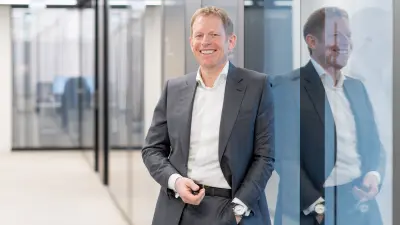
Andreas Tschiesner,
Senior Partner at McKinsey in the Automotive and Advanced Industries sector
Andreas Tschiesner graduated in material sciences and economics at the Vienna University of Economics and Business. He has been at McKinsey since 1996 and leads the automotive sector in Europe with about 470 consultants at the Munich office. He previously worked several years for McKinsey in Japan and South-east Asia. Tschiesner advises leading companies and suppliers within the automotive industry. Focal points of his work are digitalization and autonomous driving.
Summary
Autonomous mobility services will not completely replace public transport like busses and trains. Cities will regulate traffic by means of congestion charge systems and try to compensate for the shortfall in income from traffic fines. Many jobs will additionally be created in lots of industries.
